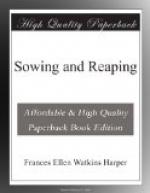“Poor foolish girl, you see what comes of taking a stranger to your bosom and making so much of him.”
“That’s just like you, John Anderson, every thing that goes wrong is blamed on me. I almost wish I was dead.”
“I wish so too,” thought Anderson but he concluded it was prudent to keep the wish to himself.
John Anderson had no faith whatever in the pretensions of his new son-in-law, but his vain and foolish wife on the other hand was elated at the dazzling prospects of her daughter, and often in her imagination visited the palatial residence of “My Son, the Earl,” and was graciously received in society as the mother of the Countess of Clarendon. She was also highly gratified at the supposed effect of Sophronia’s marriage upon a certain clique who had been too exclusive to admit her in their set. Should not those Gladstone girls be ready to snag themselves? and there was that Mary Talbot, did every thing she could to attract his attention but it was no go. My little Sophronia came along and took the rag off the bush. I guess they will almost die with envy. If he had waited for her father’s consent we might have waited till the end of the chapter; but I took the responsibility on my shoulders and the thing is done. My daughter, the Countess of Clarendon. I like the ring of the words; but dear me here’s the morning mail, and a letter from the Countess, but what does it mean?”
“Come to me, I am in great trouble.”
In quick response to the appeal Mrs. Anderson took the first train to New York and found her daughter in great distress. The “Earl” had been arrested for forgery and stealing, and darker suspicions were hinted against him. He had been a body servant to a nobleman who had been travelling for his health and who had died by a lonely farmhouse where he had gone for fresh air and quiet, and his servant had seized upon his effects and letters of introduction, and passed himself off as the original Earl, and imitating his handwriting had obtained large remittances, for which he was arrested, tried and sent to prison, and thus ended the enchanting dream of “My daughter the Countess of Clarendon.”
Chapter XXI
“I cannot ensure your life a single hour, unless you quit business. You are liable to be stricken with paralysis at any moment, if [once?] subject to the [least] excitement.[7] Can’t you trust your business in the hands of your sons?”
“Doctor,” said John Anderson, “I have only two boys. My oldest went West several years ago, and never writes to us unless he wants something, and as to Frank, if I would put the concern into his hands, he would drink himself into the grave in less than a month. The whole fact is this, my children are the curse of my life,” and there was bitterness in the tone of John Anderson[8] as he uttered these words of fearful sorrow.
“Well,” said the doctor, “you must have rest and quiet or I will not answer for the consequences.”




